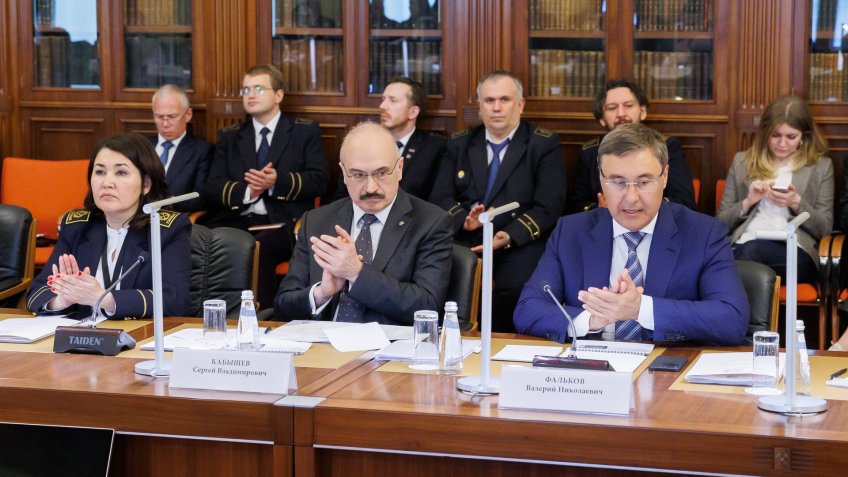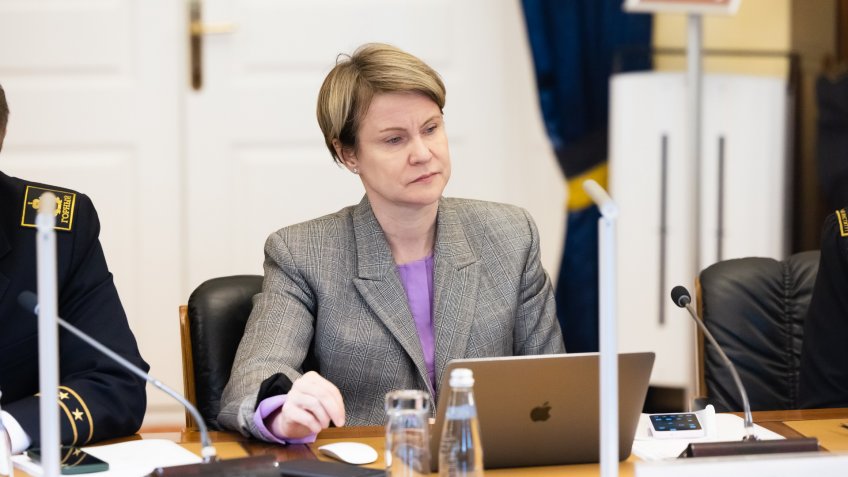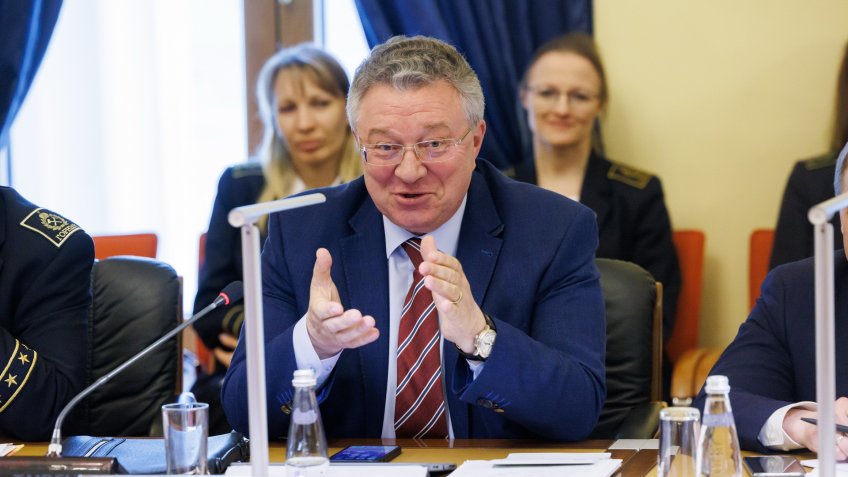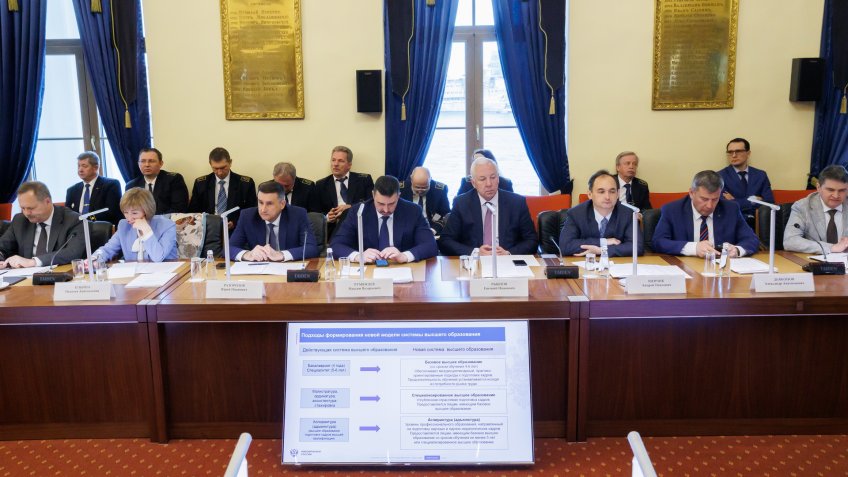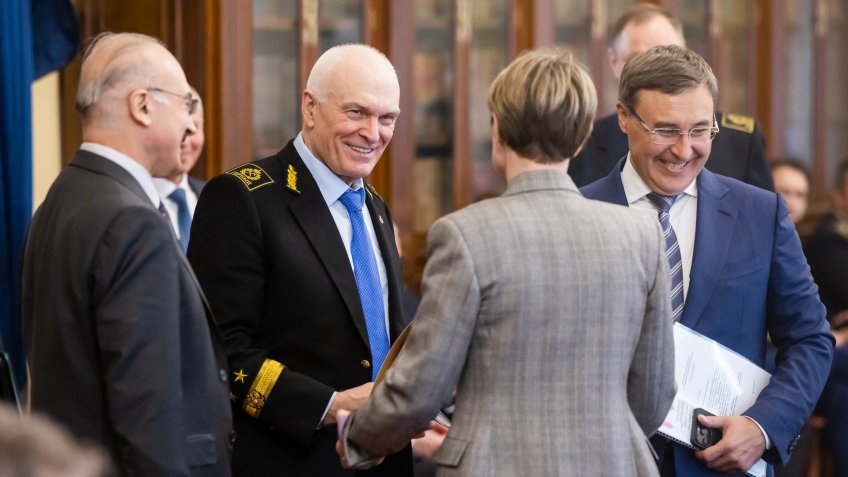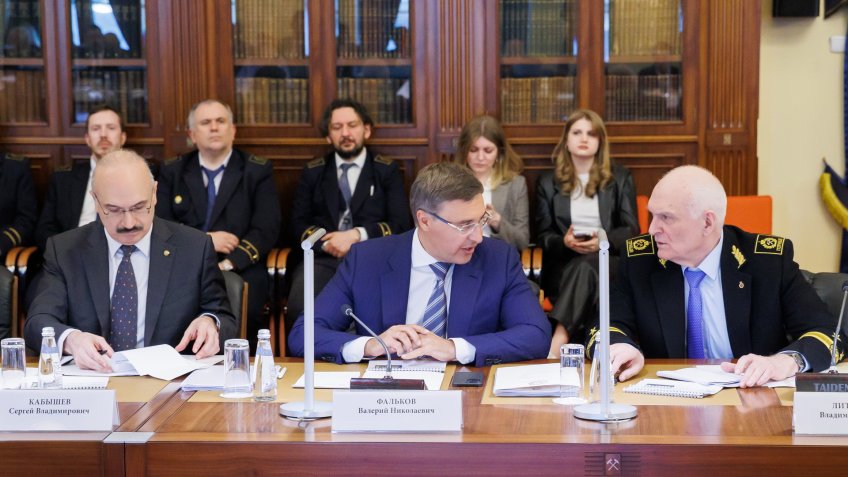
"If you want to build a country from which its sons and daughters will leave only during the vacation season, a country that will have no sense of fear for the future, then you only need to take two steps. First, equate corruption with treason against the motherland, and equate the corrupt with traitors, up to the seventh generation. Second, make the three professions the highest paid and most respected: the military, teachers and doctors."
These words of Israel's fourth Prime Minister Golda Meir were a leitmotif of the meeting of the heads of universities that are members of the Nedra Consortium (it unites educational institutions whose fields of study are connected with training specialists for mining and oil and gas companies). The meeting, which was held at the St. Petersburg Mining University, was dedicated to discussion of the new concept of the domestic higher school in connection with our country's withdrawal from the Bologna process. It was also attended by Minister of Science and Higher Education Valery Falkov, head of the Talent and Success Foundation (Sirius) Elena Shmeleva, and representatives of the State Duma and the Federation Council.
As noted Rector of the Mining University Vladimir Litvinenko, "today we observe an obvious disproportion between the need in development of the mineral and raw materials complex which is the foundation of the Russian economy and the staffing which is necessary for it." The reason for such state of affairs is, first of all, the abundance of educational programs for 4 years, which is obviously insufficient for training of young specialists. However, other factors also have a negative impact on the problem of engineers deficit, which becomes more and more acute every year.
"These include the erosion of motivators for acquiring knowledge, the decline in the prestige of scientific and pedagogical activities, which makes it difficult to select personnel, the spread of anti-scientific theories and approaches. This is largely due to the decline in the popularity of reading and the crisis of book culture, which has been replaced by the Internet and social networks. The information that teenagers and young people draw from there has a much lower threshold of reliability, which hinders the intellectual and spiritual development of the individual. Under the influence of liberal ideology, young people quickly form new values that provoke a number of worldview problems. In particular, the destruction of the continuity of historical memory, the growth of migratory attitudes, the decline of motivation to work. Duplication of Western educational templates without taking into account Russian realities only strengthened this trend. Therefore, our goal is not only to eliminate the shortage of engineers, scientists, and educators, which threatens Russia's technological backwardness, but also to create prerequisites for effective patriotic and spiritual education of students. This is a necessary condition to preserve the civilizational identity of our country," Vladimir Litvinenko addressed to his colleagues.
He emphasized to the audience that "the prosperous nation of this century will be the one that creates the most effective system of school and higher education without blind copying. That is why it is necessary to take into account many nuances when discussing the coming reform. And in the process of its implementation - to achieve unity in the actions of all stakeholders. The Ministry, as a state regulator, which sets specific tasks for universities and creates conditions for their solution, the academic community, as the engine of innovation, employers and students, motivated to create.
"Our economy is industrializing, it needs the integration of scientific and engineering knowledge. Adaptation of graduates to the market needs is possible through the transition to training specialists with higher education for 5-6 years, the subsequent defense of the diploma project and qualification "Engineer". In order to practically consolidate professional knowledge and skills after the first three years of work the employees should undergo a special certification, following the results of which they will be qualified as "professional engineer" and issued a relevant certificate," Vladimir Litvinenko emphasized.
The Minister of Science and Higher Education Valery Falkov expressed confidence that the desire of the meeting participants to consolidate efforts and develop a unified opinion based on the best initiatives is the key to the success of the coming reform. He also proposed to discuss in detail at the next meeting of the Nedra Consortium the communication of the secondary and higher schools, as well as to create working groups to study related issues.
"The restructuring of higher engineering education should be considered today as one of the most important tasks of accelerated social and economic development of the state. It is necessary to reconsider the form, terms and content of technical personnel training, so that they are qualitatively correlated with each other. It is important to move away from opposing the specialty and Bachelor's degree to the flexibility of training terms in the format of basic education. At the same time the educational process should keep the balance between fundamentality and applicability of knowledge in the conditions of changing tasks of the labor market," - said Valery Falkov.
Alexei Demidov, the chairman of the Council of Rectors of St. Petersburg and the Leningrad region, who heads the University of Industrial Technologies and Design, called the step-by-step implementation of higher education reform "a positive factor." Such an approach, in his opinion, will make it possible to avoid the kinks that are inevitable in the process of revolutionary changes, as well as to ensure "synthesis of the best Soviet experience and the system of recent years."
"Representatives of the Nedra Consortium, who take part in the public discussion about the future of higher education, advocate that the training of engineers should take 5-6 years, not less. This will be a very serious step to improve the quality of technical education. In addition, we consider it necessary to introduce mandatory certification after three years of work. Another important condition is an internship of at least six months instead of the current 2-3 weeks. Plus uniform educational standards, suggesting classes in specialized disciplines in the 5th or 6th year of study," Alexey Demidov enumerated the main proposals of the university community.
Elena Shmeleva, the head of the Talent and Success Foundation (Sirius), assured those present that the problem of engineering staff shortage cannot be solved without improving the quality of schoolchildren training. Whatever transformations may occur in the system of higher education, its results will in any case remain in direct dependence on the level of applicants. If it is extremely low, it is hardly appropriate to expect the emergence of a placer of promising graduates.
"The proposal to return to the basic training of engineers as a self-sufficient training format, and the master's degree as a specialized higher education, certainly deserves our support. It is very important to organize a coherent system that can increase the efficiency of personnel training for the regions, for the development of critical technologies that are in demand locally. But it must be integrated with school education, the quality of which cannot be measured only by the Unified State Exam or even by the Olympiads. To improve it, university teachers need to work with their colleagues from schools. For example, to develop methodological materials for curricula. In addition, you should pay attention to the subject teachers' associations, within the framework of which you can organize your work with young teachers," said Elena Shmeleva.
She also urged her colleagues to make efforts to work out clear "rules of the game," both in terms of educational standards and in terms of admission procedures. They should be "written in simple and comprehensible language, both for the academic community and for students."
Andrei Rudskoi, Rector of Peter the Great St. Petersburg Polytechnic University, turned to history and reminded that during the Soviet era, universities performed a "triune function": training, educating and providing research activities. This approach was formulated in the century before last and was brought to perfection after the Great Patriotic War.
"As for education, it was based on three pillars: fundamentality, practice-oriented and interdisciplinarity. This allowed producing a wide range of specialists, capable of quickly adapting to work in any industry. It made it possible to form the managerial staff in enterprises and state structures from experienced engineers, not from managers. And it worked," said Andrei Rudskoi.
After the collapse of the Soviet Union, the system of higher education lost its monolithic nature, "turning into a service," the quality of which has been declining over the past three decades. Educational work with young people has remained outside the responsibility of higher education institutions. But last year was a turning point. President Vladimir Putin signed two important laws: On Approving the Basic State Policy to Protect and Strengthen Russia's Traditional Spiritual and Moral Values and On Education. In the opinion of the Rector of Polytechnic University both of these documents are the foundation for the revival of Russian higher education, which has to and can regain its status as one of the best in the world.
Liliya Gumerova, Chair of the Science, Education and Culture Committee of the Federation Council, reminded that a year ago at the Committee's field session, which also took place at St. Petersburg Mining University, they reviewed the bill on training engineers with only a specialist degree. At that time it was already clear that Bachelor's degree programs do not meet the requirements of domestic economy.
"It is Rector Vladimir Litvinenko who is the author of the strategy to radically improve the quality of training and use of specialists with higher technical education. It is now being actively discussed in the academic community, business structures, and authorities, and could become the basis for future reforms. I would like to emphasize one of its points: I absolutely agree that universities should raise harmoniously developed individuals. Not only qualified specialists but also patriots united by the same frame of values," emphasized Lilia Gumerova.
She also drew attention to the need to popularize engineering professions. The objective reality is that today's young people for various reasons do not aspire to obtain them. Thus, in 2021, 129,000 kids took the physics exam, which is required to gain admission to most areas of study at technical universities, whereas in 2022 only 106,000 will do so.
"There are many proposals aimed at changing the negative dynamics, but not all of them are constructive. One of them is to lower the threshold value of the Unified State Exam in physics. In our opinion, this is not the right way out, because such a decision may lower the level of applicants, while our task is to raise it, on the contrary. However, the situation obviously requires urgent measures aimed at increasing the motivation of high school students to enter technical universities and creating healthy competition among applicants. For example, textbooks should be corrected, taking into account the Soviet experience, as the Minister of Education recently said," said Liliya Gumerova.
Sergey Kabyshev, Chairman of the State Duma Committee on Science and Higher Education, urged his colleagues to act quickly and decisively, because "our victory on all fronts depends on the quality of higher education."
"Deputies don't make up laws themselves, they pass them based on public demand. And one of them, of course, is higher education reform. I fully support the opinions that were voiced during the meeting, it will undoubtedly allow to work out the best legislative solutions", - assured Sergey Kabyshev.
Vladimir Litvinenko, rector of St. Petersburg Mining University, summarizing the discussion, said that "the potential of Russian higher school is sufficient to change the situation for the better." But this will require "mobilization of the efforts of society in order to direct its inertia towards growth of spiritual and moral state of the society."
"Russia has enormous potential for the realization of its unique natural and intellectual capital, because during Soviet times our scientists were the first in various fields of scientific knowledge: the conquest of space, the use of the peaceful atom and so on. They have managed to turn our country into a highly developed, self-sufficient power and today there are all preconditions to bring up a new galaxy of talented, highly qualified researchers and engineers on this foundation", summarized Vladimir Litvinenko.
In his opinion, one of the steps in this direction should be a gradual reduction of the number of budget places in universities by 2-3 times. The money saved should be spent on state educational grants. This will allow to support the most motivated young people to work in the real economy and create the basis for the qualitative growth of the personnel reserve.

